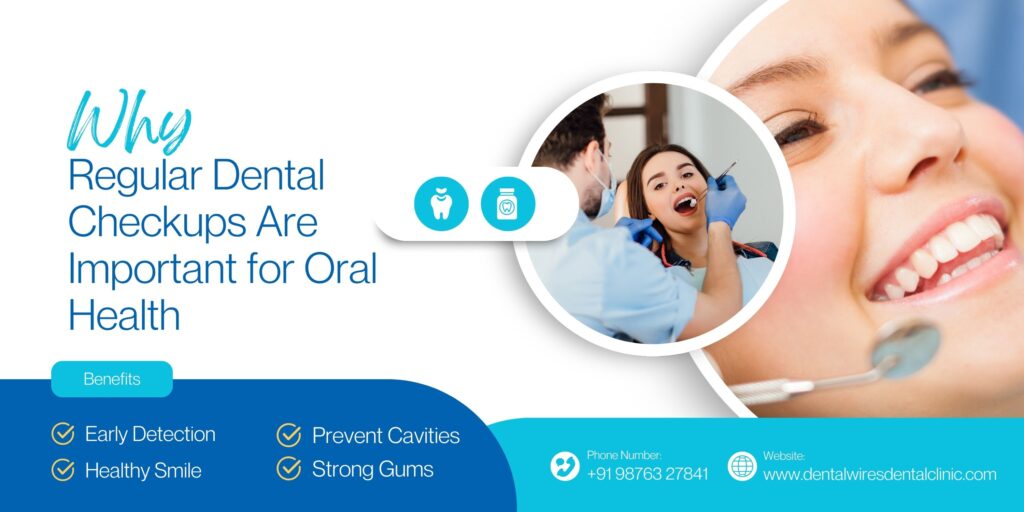Visiting your dentist for a regular dental checkup is one of the simplest oral health tips that protects your smile for life. At the same time, following everyday dental care tips at home and learning how to maintain oral health for your whole family keeps problems small and treatment easy. In this blog we explain what really happens during a visit, why early detection saves teeth (and money), and how Dental Wires Dental Clinic in Panchkula helps kids, adults, and seniors stay confident and pain‑free.
What Happens During a Routine Visit
Many people think a checkup is only about cleaning. In reality, a routine visit is a full review of the health of your mouth. Here is what most patients can expect:
- Medical & dental history update: Your dentist checks medications, medical conditions, and past treatment.
- Visual exam: Teeth, gums, tongue, cheeks, and bite are checked for cavities, gum disease, sores, and wear.
- Professional cleaning: Tartar and plaque are removed from areas a brush cannot reach, helping prevent decay and gum infection.
- Polishing & fluoride (as needed): Smooth tooth surfaces make it harder for new plaque to stick.
- X‑rays when required: Low‑dose images show hidden decay, bone levels, and developing or impacted teeth.
- Discussion & advice: Your dentist reviews findings and suggests next steps before problems become serious.
This simple appointment often takes less than an hour yet can protect years of comfort and confidence.
Early Detection: Catch Problems Before They Hurt
Dental issues start small. A soft spot in enamel can be repaired with a tiny filling if found early. Left alone, it can grow into deep decay, pain, infection, and even tooth loss. Gum inflammation is similar: early gum disease is reversible, but late‑stage periodontitis may require surgery.
Why early detection matters:
- Smaller, easier treatments.
- Lower cost compared with emergency care.
- Less pain, less time in the chair.
- Better long‑term tooth and bone preservation.
A routine visit also allows your dentist to watch changes over time. Trends matter: slow wear from grinding, minor gum recession, or shifting teeth can be managed long before major repair is needed.
Prevention for Children, Teens, Adults & Seniors (Mid Use of Focus Keyword)
Every stage of life has different risks—and a scheduled dental checkup helps catch them.
Children
Baby teeth guide permanent teeth into place. Cavities or early loss can affect speech, chewing, and future bite alignment. Fluoride, sealants, and parent guidance reduce risk.
Teens
Braces, sports injuries, and sugary snacks are common issues. Teens benefit from alignment checks, mouthguards, and strong cleaning habits.
Adults
Work stress, diet changes, and missed cleanings lead to gum disease and decay under old fillings or crowns. Regular professional care helps retain natural teeth longer.
Seniors
Dry mouth from medications, loose dentures, and bone loss around old teeth need monitoring. Adjusted cleaning tools and timely repairs improve comfort and nutrition.
Save Time, Pain & Money With Preventive Dentistry
Spending a little now saves a lot later. A filling costs less than a crown; a crown costs less than a root canal plus cap; saving a tooth is almost always cheaper and easier than replacing it. Preventive visits also reduce the risk of dental emergencies that disrupt work, travel, or important family events.
Smart tip: Ask your clinic to help you pre‑schedule your next visit before you leave. That one step keeps prevention on track.
Home Care Action List: Daily Habits That Support Your Dentist
Between visits, simple daily actions work together with professional care. These are practical oral health tips you can start today:
- Brush twice daily with a fluoride toothpaste (two minutes each time).
- Floss or use an interdental cleaner once a day.
- Rinse after sugary snacks if brushing is not possible.
- Drink more water—especially after tea, coffee, or sweet drinks.
- Replace your toothbrush every 3 months or sooner if worn.
- Use a tongue cleaner if you notice bad breath.
- Call your dentist if you see bleeding gums, swelling, or chipped teeth.
Small steps, done daily, make future visits faster and easier. These are also helpful dental care tips to teach children early.
6‑Step Family Plan on how to maintain oral health Year‑Round
Keeping everyone on schedule is easier with a simple plan. Use or adapt the steps below as family rules:
- Mark calendar reminders every six months for the dentist.
- Create a shared bathroom brushing chart—reward consistency.
- Stock travel‑size brushes in school bags and office drawers.
- Limit sticky sweets; choose nuts, fruits, or cheese snacks.
- Use night guards if anyone grinds teeth; ask your dentist to check fit.
- Review brushing technique at least once a year during your visit—professional guidance shows how to maintain oral health correctly.
These small systems reduce missed appointments and keep everyone healthier.
FAQs
How often should I visit the dentist?
Most people do well with a visit every six months, but some (gum disease, braces, diabetes) may need more frequent care.
Do I need X‑rays every time?
Not always. Your dentist recommends them based on age, risk, and symptoms.
Is professional cleaning painful?
Mild scraping is normal; tell your dentist if you are sensitive—numbing gel or ultrasonic tools can help.
Can I delay treatment if nothing hurts?
Pain usually appears late. Early care is faster, simpler, and cheaper.
8. Book Your Visit
Dental Wires Dental Clinic in Panchkula provides preventive care, orthodontics, TMJ management, cosmetic dentistry, and gentle treatment for the whole family. Convenient location, experienced specialists, and patient education come together to keep your smile bright.
Ready to schedule? Visit: https://dentalwiresdentalclinic.com/
Conclusion
Protecting your smile starts with a planned dental checkup schedule, supported by easy daily habits at home. Use the simple steps above, follow the dental care tips that fit your lifestyle, and review how to maintain oral health plan with your family. Your future self—and your smile—will thank you.
